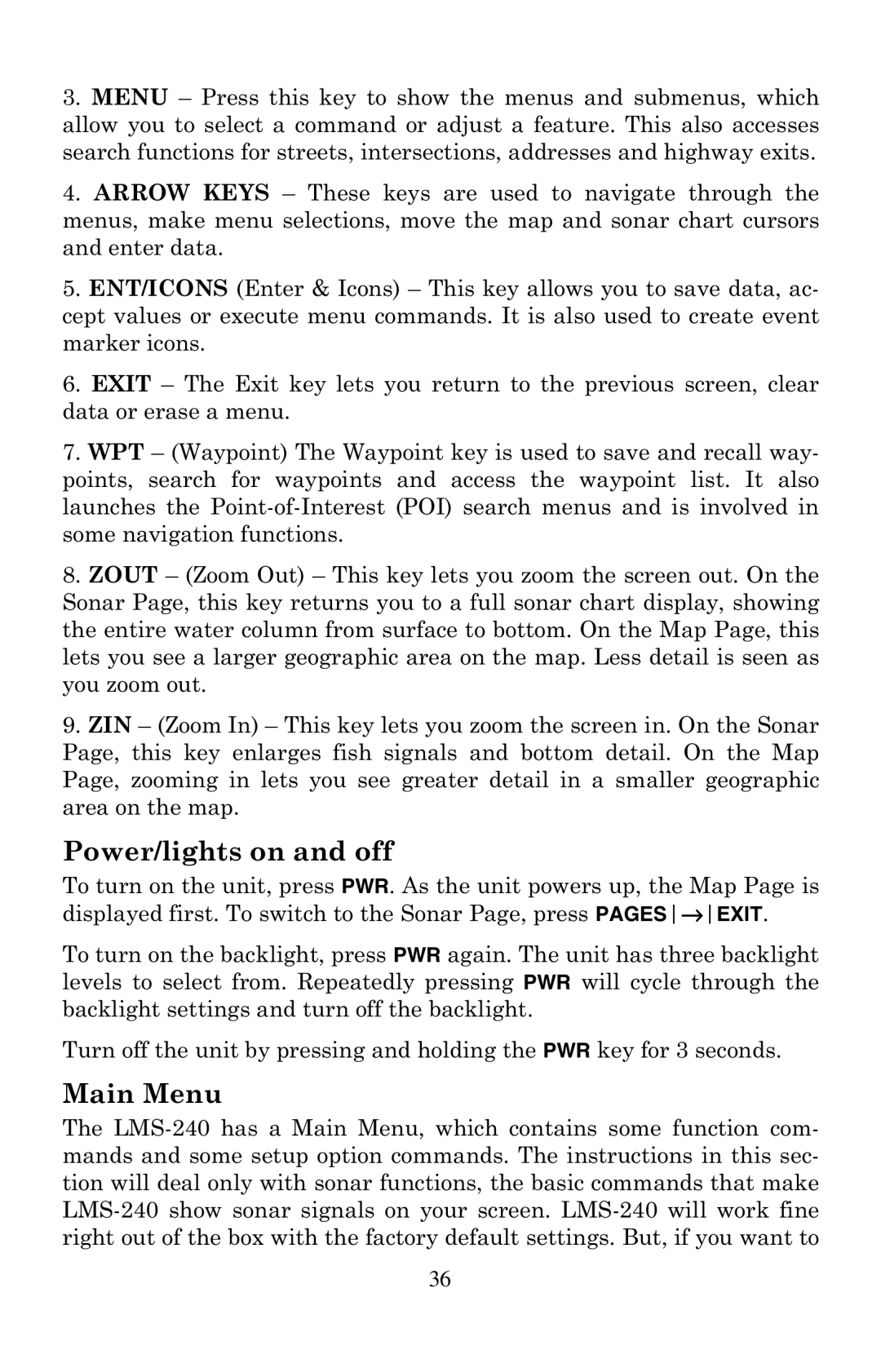2SHUDWLRQ,QVWUXFWLRQV
Ruiuhhrzqhuvpdqxdovdqgrwkhulqirupdwlrq Ylvlwrxuzhevlwh
Zzzorzudqfhfrp
RS\ULJKW‹/RZUDQFHOHFWURQLFV,QF $OOULJKWVUHVHUYHG
RZUDQFHOHFWURQLFV,QF
7DEOHRI&RQWHQWV
6HF6RQDU7URXEOHVKRRWLQJ 6HF%DVLF*362SHUDWLRQV
Iii
6HF6\VWHP6HWXS*366HWXS2SWLRQVLQDOSKDEHWLFDORUGHU
$51,1
+RZWKLVPDQXDOFDQJHW\RXRXWRQWKHURDGIDVW
DQGKHDGIRUWKHZDWHUZLWK\RXU/06
Wlrqvrujdqlhglqdoskdehwlfdorughu
DSDELOLWLHVDQG6SHFLILFDWLRQV
5RXWHV
6SOLWVFUHHQRRP HV 6XUIDFHZDWHUWHPS HV
3RVLWLRQXSGDWHV YHU\VHFRQG
127
+RZ/066RQDURUNV
Wkhxqghuzdwhuedvlfv
Vrqdofrpsxwhuv
RXU/06OLVWHQVWRVLJQDOVIURPDVPDQ\VDWHOOLWHVDVLWFDQVHH
QWURGXFWLRQWR*36DQG$$6
$PLQLPXPRIWKUHHVDWHOOLWHVDUHUHTXLUHGWRGHWHUPLQHDIL
+RZHYHU$$6KDVVRPHOLPLWV\RXVKRXOGNQRZDERXW
Pruh Dffxudwh RXU /06 Uhfhlyhv Erwk *36 DQG $$6 Vljqdov
36LVSOHQW\DFFXUDWHIRUURXWHQDYLJDWLRQEXWWKH86HGHUDO$YLD
0HQX&RPPDQGV
$UURZ.H\V
\ERDUG
Qvwuxfwlrqv 0HQX6HTXHQFHV
Suhihuexwzhuhfrpphqgwklvlqvwdoodwlrqvhtxhqfh Dxwlrq
3UHSDUDWLRQV
7UDQVGXFHU,QVWDOODWLRQ
0RXQWWKHVRQDU*36XQLW
Rrgdqgsrruwudqvgxfhuorfdwlrqv
RFDWLRQ¥*HQHUDO¥$OO7UDQVGXFHUV
Good location Poor location Poor angle
7KLVDOVRUHGXFHVWKHSRVVLELOLW\RIDLUEXEEOHLQWHUIHUHQFH
Ƒ7UDQVGXFHU2QO\
7UDQVGXFHU$VVHPEO\DQG7UDQVRP0RXQWLQJ
6KRRWWKUXKXOOYV7UDQVRP0RXQWLQJ
Whhqghjuhhdqjoh
Bolt
Ratchets
Metal Nut washer Rubber Washers
$VVHPEOHWUDQVGXFHU
Transom
Dqgvhhqiurpderyhuljkw
5RXWHFDEOHWKURXJKEUDFNHWDQGPRXQWWUDQVGXFHUVLGHYLHZOHIW
$51,1
7UDQVGXFHU2ULHQWDWLRQDQGLVK$UFKHV
Transducer aimed
6KRRWWKUX+XOO3UHSDUDWLRQ
Partial fish arches
7UDQVGXFHUDQJOHVDQGWKHLUHIIHFWVRQILVKDUFKHV
Gxfhruholplqdwhwkhvrqduvljqdov
SR\WKHWUDQVGXFHUWRDVROLGSRUWLRQRIWKHKXOO
Spread epoxy here Sand this surface
6KRRWWKUXKXOO,QVWDOODWLRQ
Transducer location High speed Trolling speed
SR\WUDQVGXFHUWRKXOO
637035$785616256
677
Qrwuhfrpphqghg
Temperature sensor SP-X speed sensor
LMS-240 rear view Two-temperature sensor installation
Temperature sensor
6HQVRU&KDUW
6WHUQYLHZVKRZLQJJRRGORFDWLRQIRUPRXQWLQJVHQVRURQWUDQVRP
2SWLRQDO6SHHG6HQVRU,QVWDOODWLRQ
Good location
\RXZLVKWRSXUFKDVHDQRSWLRQDOVSHHGVHQVRUIRU\RXU/06UH
36$QWHQQD5HFHLYHU0RGXOH
Transom Bottom of hull
0RGXOHERWWRPYLHZOHIWDQGWRSYLHZULJKW
3RZHUFRQQHFWLRQVIRUWKH/06VRQDU*36XQLW127IRUFODULW\
To unit Red wire Black wire Amp Fuse Volt battery
3RZHU&RQQHFWLRQV
WKHSRZHUFDEOH6HHWKHPLQWKHGUDZLQJRQSDJH
10$*36&DEOH&RQQHFWLRQV
$87,21
Frphwkhlqwhuqdwlrqdopdulwlphvwdqgdugirupdulqhqdyljdwlrq
10$*36LULQJ
RPZLULQJWRUHFHLYH*36SRVLWLRQLQIRUPDWLRQ IURPD*36UHFHLYHU
Transducer GPS antenna Module
Com port
Two
06FDEOHFRQQHFWLRQV
2SWLRQDO5$0PRXQWLQJV\VWHP
UDFNHW,QVWDOODWLRQ
Xqlw
Front
URQWYLHZOHIWDQGVLGHYLHZULJKWVKRZLQJGLPHQVLRQVRI/06
173.9 72.9 23.4 137.9 Millimeter 56.9 Inch
VRQDU*36XQLWZKHQPRXQWHGRQJLPEDOEUDFNHW
\RXZLVK\RXFDQILOOLQWKHKROHDURXQGWKHFDEOHVZLWKDJRRGPD
146.5
QDVK,QVWDOODWLRQ
3RUWDEOH,QVWDOODWLRQ
113.5
Cell battery
00&RU6&0HPRU\&DUG,QVWDOODWLRQ
QVWDOOEDWWHULHVLQSRZHUSDFNEDWWHU\DGDSWHU
UDJWKH00&IURPWKHVORW
2WKHU$FFHVVRULHV
7RUHPRYHDQ00
7RDGGDQ00&RU6
DFH&RYHU
4908
Basic Sonar Operation
\ERDUG
3RZHUOLJKWVRQDQGRII
0DLQ0HQX
\VWHP6HWXSDQG*366HWXS2SWLRQV
0DLQ0HQX
5RXWH3ODQQLQJFRPPDQGXVHGWRSODQYLHZRUQDYLJDWHDURXWH
3DJHV0HQXVKRZLQJVRPH6RQDUGLVSOD\RSWLRQV
3DJHV
6DWHOOLWH6WDWXV3DJH
7ULS&DOFXODWRUFRPPDQGVKRZVWULSVWDWXVDQGVWDWLVWLFV
1DYLJDWLRQ3DJH
1DYLJDWLRQ3DJHUHFRUGLQJDWUDLOWUDYHOLQJVRXWKZHVW
6RQDU3DJH
0DS3DJH
Wrmapexit
WKHIXOOPDSRSWLRQ$WULJKWPDSZLWKVRQDURSWLRQ
Iurpohiwvsolwrrpvrqdufkduwdqggljlwdogdwd
2WKHUVRQDUFKDUWGLVSOD\RSWLRQVLQFOXGH
$WULJKW6RQDU3DJHLQIXOOVRQDUFKDUWGLVSOD\PRGH
6RQDU3DJH0HQX0RVWRIWKHVHIXQFWLRQVDUHGLVFXVVHGLQ6HF
6RQDU3DJHVKRZLQJIXOOVRQDUFKDUWPRGH
Wlrqdftxluhgphvvdjhdsshduv
066RQDU4XLFN5HIHUHQFH
DXQFK\RXUERDW 7RWXUQRQ/06SUHVVDQGUHOHDVHPWRNH\
Suhvvexit
6RQDU2SHUDWLRQV
6HQVLWLYLW\&RQWURO%DU
$WOHIW6RQDU0HQXZLWK6HQVLWLYLW\FRPPDQGVHOHFWHG$WULJKWWKH
LVK6\PEROVYVXOO6RQDU&KDUW
3UHVVMENUMENU↓WRSYSTEM SETUPENT↓WRRESET OP
To Restore Factory Settings
LVK,LVPRVWKDQG\ZKHQ\RXUHLQDQRWKHUSDUWRIWKHERDWRUSHU
Dqsulqwlqixoofroru LQGRZFDQG\QDPLFDOO\EHVLHGRQ\RXUPRQLWRU
$GMXVWPHQWVXSGDWHWKHHQWLUHUHFRUGGLVSOD\HG
Rorulqwhusuhwdwlrqrivrqduvljqdovfdqehxvhughilqhg
4908
$63$GYDQFHG6LJQDO3URFHVVLQJ
URPWKH6RQDU3DJHSUHVVMENU↓WRSONAR Featuresent
6HFWLRQ6RQDU2SWLRQV2WKHUHDWXUHV
Vleohxqghuprvwfrqglwlrqv
3UHVV↓WRNOISE Rejectionent
3UHVVMENUMENU↓WRALARMSENT↓WRSONAR Alarmsent
$ODUPV
7RUHWXUQWRWKHSUHYLRXVSDJHSUHVVEXITEXIT
To adjust and turn on the deep alarm
3UHVV←WRSHALLOW Alarm Enabledentexitexitexit
3UHVV←WRDEEP Alarm Enabledentexitexitexit
To adjust and turn on the zone alarm
LVK$ODUP
To turn the fish alarm on
DOLEUDWH6SHHG
Lveodqnlqglfdwlqjwkhdoduplvwxuqhgrii
$WULJKW&KDUW6SHHG&RQWURO%DU
3UHVV MENUMENU↓ WR Sonar SETUPENT↓ WR Calibrate Water
KDUW6SHHG
$WOHIW6RQDU3DJHPHQXZLWK&KDUW6SHHGFRPPDQGVHOHFWHG
HSWK&XUVRU
HSWK5DQJH$XWRPDWLF
Dqgihhw
To switch to Manual Depth Range
HSWK5DQJH0DQXDO
Shduv
HSWK5DQJH8SSHUDQG/RZHU/LPLWV
7RFKDQJHWKHXSSHUDQGORZHUOLPLWV
Qxpehu DQG Uhshdw Xqwlo WKH Ghswk LV Fruuhfw Wkhq Suhvv
IXODGGLWLRQWRILVKLQJDWDVWDWLRQDU\ORFDWLRQ
DV7UDFN
7RWXUQRIIXSSHUDQGORZHUOLPLWV
Fish arches Area zoomed
LVK,LVK6\PEROVHSWKV
7RWXUQWKHLVK,IHDWXUHRQ
URP WKH 6RQDU 3DJH Suhvv MENU↓ WR Sonar FEATURESENT→ WR
LVK7UDFN
7RWXUQRIILVK,UHSHDWWKHLQVWUXFWLRQVLQVWHS
Symbols with FishTrack depths
LVK5HYHDO
7RWXUQRQLVK7UDFN
6RQDU&KDUW0RGHFRPPDQGZLWKLVK5HYHDOVHOHFWHG
3UHVV↓WRSONAR Chart MODEENT↓WRFISHREVEALENT
7RWXUQLVK5HYHDORQ
Fish Not Visible Arch
UD\OLQH
6RQDU3DJH0HQX
Hard Fish near
Grayline Hard Bottom Muddy bottom Muddy bottom bottom
+\SHU6FUROO
RJ6RQDU&KDUWDWD
1RLVH5HMHFWLRQ
To select data for display
2YHUOD\DWD
3UHVV↓RU↑WRVHOHFWDWD7\SHENT
URPWKH0DSRU6RQDUSDJHSUHVVMENU↓WROVERLAY Dataent
To change displayed data font size
7RUHWXUQWRWKHSUHYLRXVSDJHSUHVVEXIT
To turn off displayed data
URP WKH 0DS RU 6RQDU Sdjh Suhvv MENU↓ WR Overlay
3LQJ6SHHG+\SHU6FUROO
Steering arrow
7RFKDQJH3LQJ6SHHG URPWKH6RQDU3DJHSUHVVMENU↓WRPING Speedent
7RDGMXVW6HQVLWLYLW\ URPWKH6RQDU3DJHSUHVVMENUENT
5HVHWDWHULVWDQFH
3UHVV MENUMENU↓ WR Sonar SETUPENT↓ WR Reset Water DIS
5HVHW2SWLRQV
6HW.HHO2IIVHW
3UHVVMENUMENU↓WRSONAR Setupentent
VLJQWRDPLQXV¥VLJQ
3UHVV→WRWKHVHFRQGQXPEHUWKHQSUHVV↑WRFKDQJHWKHQXPEHUWR
$XWRPDWLF6HQVLWLYLW\
6HQVLWLYLW\$XWR6HQVLWLYLW\
Wkhzdwhughswkiurpvxuidfhwrerwwrp
MXVWPHQWVDOORZLQJIRUWKHVHWWLQJ\RXVHOHFWHG
7RWXUQ$XWR6HQVLWLYLW\EDFNRQ
6XUIDFH&ODULW\
7RDGMXVWVHQVLWLYLW\LQPDQXDOPRGH
Erdwzdnhvwhpshudwxuhlqyhuvlrqdqgpruh
3UHVVENT↓RU↑WRVHOHFWFODULW\OHYHOEXITEXITEXIT
6RQDU&KDUW0RGH
7RDGMXVWWKH6XUIDFH&ODULW\OHYHO
7KHULJKWYLHZVKRZV6XUIDFH&ODULW\VHWDW+LJK
XOO6RQDU&KDUW
6RQDU3DJH6RQDU&KDUWLVSOD\2SWLRQV
7RFKDQJHWKHFKDUWPRGHFRORUVFKHPH
3DJHV0HQXVKRZLQJVRQDUFKDUWGLVSOD\RSWLRQV
6SOLW=RRP6RQDU&KDUW
LJLWDODWD&KDUW
Duherwkvhwwrwkhvpdoowhwvlh
Customizing the Digital Data/Chart Screen
LJLWDODWD&KDUW
0DSLWK6RQDU6SOLW6FUHHQ
=RRP ,Q DQG =RRP 2XW NH\V Fruuhvsrqg WR 7R GR Wklv Suhvv
LVWKHDFWLYHZLQGRZ7RVZLWFKEDFNMXVWSUHVVPAGESPAGESDJDLQ
6RQDU6LPXODWRU
Title bar with chart file name Play symbol flashing
URPWKH6RQDU3DJHSUHVVMENUMENU↓WRSONAR SETUPENT↓WR
7XUQ RII 6RQDU 6LPXODWRU E\ Suhvvlqj MENUMENU↓ WR Sonar
3UHVVMENUMENU↓WRSONAR SETUPENT↓WRSONAR Simulatorent
3UHVV↓WRCHART Usedent
3UHVVMENU↓WRSTOP Chartentexit
6WRS&KDUW
5LJKWVDPHYLHZRRPHGWR
8SSHUDQG/RZHU/LPLWV
=RRP=RRP%DU
6HHWKHHQWU\LQWKLVVHFWLRQIRUHSWK5DQJH8SSHUDQG/RZHU/LPLWV
Hdnerwwrphfkrgljlwdouhdglqjvhuudwlfruqrilvkvljqdov
Khfnwkhixvh
8QLWIUHHHVORFNVXSRURSHUDWHVHUUDWLFDOO\
Qvshfwwkhwudqvgxfhufdeohirueuhdnvfxwvruslqfkhgzluhv
1RILVKDUFKHVZKHQWKHLVK,IHDWXUHLVRII
12,6
Wudqvgxfhurzqhuvpdqxdoiruwkhehvwprxqwlqjsrvlwlrq
4908
6HFWLRQ DVLF*362SHUDWLRQV
7KH /06 KDV D 0DLQ 0HQX Zklfk Frqwdlqv Vrph Ixqfwlrq FRP
0DLQ0HQX
3DJHV0HQXVKRZLQJVRPH0DSGLVSOD\RSWLRQV
OHFWSTATUS&OHDUWKH3DJHV0HQXE\SUHVVLQJEXIT
Srvlwlrqdftxluhgodwlwxghorqjlwxghdqgdowlwxgh
7KH6DWHOOLWH6WDWXV3DJHVKRZQSURYLGHVGHWDLOHGLQIRUPDWLRQRQWKH
Displays Present position arrow Trail line
127
Vhfrqgv
1DYLJDWLRQ3DJHEDFNWUDFNLQJDWUDLOZKLOHFUHDWLQJDQHZWUDLO
Dydlodeohpdsrrpudqjhviurpplohvwrplohv
Gliihuhqwzlqgrzv
Qrwhvwkhdfwlyhzlqgrz
QSDJHVWKDWKDYHWZRPDMRUZLQGRZVVXFKDVWZRPDSV\RXFDQWRJ
QDYLJDWLRQLQWRRVPDOODQDUHDZLOOFRQVWDQWO\WULJJHUDUULYDODODUPV
=RRPLQFORVHUWRVHHJUHDWHUGHWDLOSUHVVZINRRPLQNH\
LQGRXU&XUUHQW3RVLWLRQ
LQGLQJ\RXUFXUUHQWSRVLWLRQLVDVVLPSOHDVWXUQLQJ/06RQ8Q
6HDUFKLQJ
6HOHFWLQJ$Q\0DS,WHPLWKWKH&XUVRU
6HDUFKLQJ
$IWHU/06KDVDFTXLUHGDSRVLWLRQ 3UHVVWPT↓WRRESTAURANTS
Wkhqhduhvwuhvwdxudqwvuljkw
7KH32,LQIRUPDWLRQVFUHHQDSSHDUV7KLVLVKRZ\RXFDQXVH/06
LQGD\SRLQW0HQXOHIW&DWHJRU\6HOHFWLRQPHQXFHQWHUDQGOLVWRI
100
6HWDD\SRLQW
Wxghdqgorqjlwxghglvwdqfhdqgehdulqj
0DSVFUHHQVKRZLQJLQGLQJD\SRLQW Wkhuhvxowriduhvwdxudqwvhdufk
Create Waypoint at Current Position
7RFUHDWHDQGVDYHDD\SRLQW
101
Step
102
1DYLJDWH7RDD\SRLQW
7REHJLQQDYLJDWLQJWRWKHZD\SRLQWSUHVVENT
Create Waypoint on Map
103
6HW0DQ2YHUERDUG02%D\SRLQW
1DYLJDWH%DFNWR02%D\SRLQW
1DYLJDWLRQ3DJHQDYLJDWLQJWRZDUGZD\SRLQWDQGOHDYLQJDWUDLO
1DYLJDWHWR&XUVRU3RVLWLRQRQ0DS
104
2RORJDK2NODKRPD
Vwrsvvkrzlqjqdyljdwlrqlqirupdwlrq
105
1DYLJDWHWRFXUVRU,QWKLVHDPSOHWKHFXUVRUKDVVHOHFWHGWKHWRZQRI
7R6DYHD7UDLO 3UHVVMENUMENU↓WRMY Trailsent
1DYLJDWHWRD3RLQWRI,QWHUHVW
UHDWLQJDQG6DYLQJD7UDLO
106
107
Visible symbol Active Symbol
3UHVV↓WRWKH$FWLYH7UDLO1DPHENT 3UHVV↓WRACTIVEENT
$QRWKHUTXLFNZD\WRVWRSUHFRUGLQJRQHWUDLODQGEHJLQDQHZRQH
7RWXUQRIIWUDLOGLVSOD\ 3UHVVMENUMENU↓WRMY Trailsent
LVSOD\LQJD6DYHG7UDLO
1DYLJDWLQJ7UDLOV
108
Irupdwlrqdorqjwkhwudlo
9LVXDO7UDLOLQJ
GHVLUHG7UDLO1DPHENT 3UHVV→WRDELETE TRAIL↓WRNAVIGATEENT
1RZEHJLQPRYLQJDQGIROORZ\RXU/06
Trail
110
North Ï
Dotted line
111
7UDQVIHU&XVWRP0DSVDQG*36DWDLOHV
XVWRP0DSV
3UHVV → WR ACTIONENT→ WR REVERSEENT← WR Navigateent 7KH
00&RUORDGGDWDIURPWKH00&LQWR/06VPHPRU\
36DWDILOHV
112
7KH7UDQVIHU0\DWDVXEPHQXDVNVLI\RXZDQWWRVDYHGDWDWRWKH
113
Save Dataent
DQFHO1DYLJDWLRQ
114
7KHVHILJXUHVVKRZWKHPHQXVHTXHQFHIRUORDGLQJD*36DWDLOH
115
LQGLVWDQFHURP3RLQWWR3RLQW
3UHVVEXITWRUHWXUQWRUHJXODURSHUDWLRQ
7KHGLVWDQFHWRDOODVIURPWKHVWDUWLQJSRLQWLVPLOHV
HOHWHDQ,FRQ
Frqv
FXUUHQWSRVLWLRQZKLOH\RXDUHQDYLJDWLQJ UHDWH,FRQRQ0DS
116
1DYLJDWHWRDQ,FRQ
3UHVVMENU↓WRDELETE MY Iconsent
Suhvvent
117
SUHVVMENUMENU↓WRROUTE Planningent
5RXWHV
UHDWHDQG6DYHD5RXWH
118
ZLWK$GGURP0DSFRPPDQGVHOHFWHG
3DJHDSSHDUVZLWKWKHFXUVRUVKRZLQJ
119
GLW5RXWHPHQXOHIWGLW5RXWHD\SRLQWVPHQXULJKW
120
5HSHDWVWHSILYHXQWLOWKHURXWHUHDFKHV\RXUGHVWLQDWLRQ
SUHVVMENUMENU↓WRROUTE Planningent 3UHVV↓WRURXWHQDPHENTENT
HOHWHD5RXWH
Rxfdqdovrghohwhdoourxwhvdwrqfh
121
1DYLJDWHD5RXWHLQ5HYHUVH
SUHVVMENUMENU↓WRCANCEL NAVIGATIONENT← to Yesent
1DYLJDWHD5RXWH
122
123
7UDLOV
HOHWHD7UDLO
7RHGLWDWUDLOQDPHSUHVVMENUMENU↓WRMY TRAILSENT↓WRWUDLO
8WLOLWLHV
\SRLQWV
6HWDD\SRLQWE\$YHUDJH3RVLWLRQ
QDPHENT→WREDIT Waypointent
6HOHFWLQJDD\SRLQW
Wlrqvdqgrwkhuidfwruv 3UHVVWPT→WRSUBCATEGORYFROXPQ↓WRNEWENT
Whuhvwolvw 3UHVVWPT→WRSUBCATEGORYFROXPQ↓WRNEWENT
126
Suhvventdqgwkhsrlqwvsrvlwlrqdsshduvdvwkhuhihuhqfhsrvlwlrq
$ODUPVFRPPDQGOHIW$ODUPPHQXULJKW
7RFKDQJHDODUPVHWWLQJV 3UHVVMENUMENU↓WRALARMSENT
127
RIDPLOHRUPRUHWRWKHULJKWRUOHIWRIWKHOLQHWRWKHZD\SRLQW
EO\ORRNLQJIRUWKHZURQJVDWHOOLWHV
$XWR6DWHOOLWH6HDUFK
03257$17$/$501276
128
3UHVVMENUENT←WR Yesent
KHFN00&LOHVDQG6WRUDJH6SDFH
RPPXQLFDWLRQV3RUW&RQILJXUDWLRQ
7RFKHFN00&LOHV
3UHVV↓WRCONFIGURE NMEA→WRCONFIGURE Dgpsent
3UHVVMENUMENU↓WRSYSTEM Setupent
Uhfhlyhuv 3UHVVMENUMENU↓WRSYSTEM Setupent
RQILJXUH*36
131
RQILJXUH10$
RRUGLQDWH6\VWHP6HOHFWLRQ
RXFDQFRQILJXUHWKHXQLWWRXVHVSHFLILF10$VHQWHQFHV
RQILJXUH/RUDQ7PHQX
Wkhdowhuqdwh
132
7RFKDQJHWKHFRRUGLQDWHV\VWHPSUHVVENTZKLOHCOORDINATE Systemlv
Fkduwruwrsrjudsklfdopds
7RFRQILJXUHDPDSIL
133
RQILJXUHDPDSILVR/06FDQILQG\RXUSRVLWLRQRQDSULQWHG
XVWRPLH6DWHOOLWH6WDWXV3DJH
XVWRPLH3DJHLVSOD\V
366LPXODWRU
XVWRPLH1DYLJDWLRQ3DJH
366HWXS0HQXOHIW*366LPXODWRUPHQXULJKW
7RJHWWRWKH*366LPXODWRU 3UHVVMENUMENU↓WRGPS Setupent
135
XVLQJWKHDUURZNH\VSTEER SIMULATORFRPPDQGRUE\VHWWLQJWKHWUDFN
Hoolwhorfnrqrudqhzvlpxodwruorfdwlrq
+LGH*36HDWXUHV
QLWLDOLH*36
136
0DS$XWR=RRP
0DSDWD
WXUQWRWKHSDJHGLVSOD\ 0DS%RXQGDULHV
3UHVVMENUMENU↓WRGPS SETUPENT↓WRMAP Datument
0DSDWXP6HOHFWLRQ
WXUQWRWKHSDJHGLVSOD\ LOO/DQG*UD\
7RJHWWR0DS&DWHJRULHV
0DSHWDLO&DWHJRU\6HOHFWLRQ
0DS2ULHQWDWLRQ
139
140
Track Up mode, map shows N and arrow to indicate north
0DSRULHQWDWLRQDWOHIWLVVKRZQLQQRUWKXSDQGDWULJKWWUDFNXS
Wkhqsuhvventexitexit
1DYLRQLFV&KDUWV
7RGLVSOD\D1DYLRQLFVFKDUW
141
7RYLHZ3RUW6HUYLFHVLQIRUPDWLRQ
Port Services icons Pop-up name box Cursor lines
3RUW,QIRUPDWLRQ
142
143
7LGDO&XUUHQW,QIRUPDWLRQ
7RYLHZ7LGDO&XUUHQWLQIRUPDWLRQ
3RUW6HUYLFHVLQIRUPDWLRQVFUHHQV
144
7RFOHDUWKHLQIRUPDWLRQVFUHHQSUHVVEXIT 7LGH,QIRUPDWLRQ
7RYLHZWLGHLQIRUPDWLRQ
XUUHQW,QIRUPDWLRQVFUHHQ
Cursor line Pop-up name box Tidal Station icon
Qirupdwlrqvfuhhq
145
7LGH,QIRUPDWLRQVFUHHQ
7RFOHDUWKHLQIRUPDWLRQVFUHHQSUHVVEXIT
3RSXS+HOS
3RVLWLRQ3LQQLQJ
UHWXUQWRWKHSDJHGLVSOD\
Wryesent
3UHVVEXITEXITWRUHWXUQWRWKHSUHYLRXVSDJH
7RUHVHWDOOIHDWXUHVWRWKHLUIDFWRU\GHIDXOWV
147
7RDGMXVWWKHGLVSOD\VFRQWUDVW
6FUHHQ&RQWUDVWDQG%ULJKWQHVV
7RDFFHVVWKH6FUHHQPHQXSUHVVMENUMENUENT
7RDGMXVWWKHGLVSOD\VEULJKWQHVV
6HW/DQJXDJH
6HW/RFDO7LPH
150
6RIWZDUH9HUVLRQ,QIRUPDWLRQ
5HDGWKHLQIRUPDWLRQGLVSOD\HGRQWKHVFUHHQ
\VWHP6HWXSFRPPDQGOHIW6RIWZDUH,QIRUPDWLRQFRPPDQGFHQWHU
EXITEXITWRUHWXUQWRWKHSDJHGLVSOD\
6RXQGVDQG$ODUP6RXQG6W\OHV
7UDFN6PRRWKLQJ
151
HOHWH$OO7UDLOV
7UDLO2SWLRQV
7RDFFHVVWKH7UDLOV0HQX 3UHVVMENUMENU↓WRMY Trailsent
Wrdelete ALLENT←WRYESENT ODVK7UDLOVRQ6FUHHQ2SWLRQ
1HZ7UDLO
UHWXUQWRWKH7UDLO2SWLRQV0HQX
HOHWH7UDLO
153
Wlfxoduwudlo
8QLWVRI0HDVXUH
7UDLO9LVLEOH,QYLVLEOHDQG2WKHU7UDLO2SWLRQV
154
LQGD\SRLQWPHQXOHIWDQG0DS3DJHPHQXULJKW
LQG$GGUHVVHV
155
LQG$GGUHVV0HQX
LQG$GGUHVVPHQXOHIWLQG6WUHHWPHQXFHQWHU
Ilhog
156
ZLWKLQG%\1DPHILHOGDFWLYHVWUHHWQDPHHQWU\FRPSOHWHULJKW
157
LW\E\QDPHULJKW
LQGFLW\ILHOGOHIW6HDUFKLQSDUWLFXODUFLW\RQO\RSWLRQFHQWHULQG
LQG$Q\,WHP6HOHFWHGE\0DS&XUVRU
158
LQG%\1DPHPHQXULJKW
LQG,QWHUVWDWH+LJKZD\LWV
159
LQG+LJKZD\LWVFRPPDQGOHIWDQGLQGLWPHQXULJKW
160
LQGLWPHQXZLWKDQHLWVHOHFWHGLQWKHLW/LVW
R7RLWRSWLRQOHIWLQG2Q0DSRSWLRQULJKW
161
LQG0DS3ODFHVRU3RLQWVRI,QWHUHVW32
Pdwlrqvfuhhq
ZLWKWKH593DUNVVXEFDWHJRU\VHOHFWHGULJKW
LQGE\QDPHRSWLRQOHIWLQGE\QDPHPHQXULJKW
LQG6WUHHWVRU,QWHUVHFWLRQV
162
R7R32,RSWLRQOHIWLQGRQ0DS32,RSWLRQULJKW
LQG6WUHHWVFRPPDQGOHIWLQG6WUHHWVPHQXULJKW
163
LQG6WUHHW%\1DPHPHQX6SHOORXWQDPHLQ
Wkhwrserruvhohfwiurpwkholvwlqwkhorzhuer
LQGDQ,QWHUVHFWLRQ
164
7KH0DS3DJHDSSHDUVZLWKWKHFXUVRUSRLQWLQJWRWKHIRXQGVWUHHW
165
LQG,QWHUVHFWLRQFRPPDQGKLJKOLJKWHGOHIWDQG
166
LQGD\SRLQWV
3UHVVWPTENT
LQGE\1DPHFRPPDQGULJKW
Wlrqvfuhhqdsshduv
167
168
WKHIRXQGZD\SRLQWLVKLJKOLJKWHGE\WKHFXUVRURQWKH0DS3DJH
LQG%\1DPHPHQXOHIWD\SRLQW,QIRUPDWLRQVFUHHQFHQWHU$WULJKW
DWXPV8VHGE\/06
169
170
171
172
Rpsoldqfh
173
174
175
176
177
178
179
180
25$1&$7$%$66/,&16$*5017
181
3ULFHVDQGSURJUDPVDUHVXEMHFWWRFKDQJHZLWKRXWQRWLFH
$7$%$66/,0,7$55$17
182
Pdqxdoiruwkhsurgxfw
25$1&/&7521,&6 8//21$5$55$17
183
RULJLQDOSXUFKDVHLQFDVHZDUUDQW\VHUYLFHLVHYHUUHTXLUHG
DPWRSP&HQWUDO6WDQGDUG7LPH0
Qrwwrooiuhh
184
DPWRSPDVWHUQ6WDQGDUG7LPH0
Fdugvsohdvhfrqwdfw
Dqdgldqfxvwrphuvfdqzulwh
Rzudqfhdjoh &DQDGD 0DWKHVRQ %OYG 0LVVLVVDXJD 2QWDULR /5RUID
9LVLWRXUZHEVLWH
